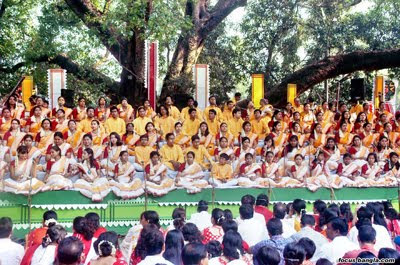The nation on Wednesday celebrated Pahela Baishakh, the opening day of the Bangla year 1417, in the midst of tight security with traditional songs, music, fanfares and colorful processions.
Thousands of people from all walks of the society dressed in traditional costumes thronged the streets, parks and open spaces across the capital.
Tight security measures were taken in and around the traditional venue of the carnival,
The day was a public holiday.
Mughal Emperor Akbar introduced the tradition of celebrating the Bangla New Year in relation to closing of the annual tax collection. Traditionally, traders and shopkeepers open halkhata (fresh accounts) on this day and serve sweetmeats to clients.
Accordingly, Fatehullah Shirazi, a renowned scholar and astronomer, formulated the Bengali year on the basis of the lunar Hijri and Bengali solar calendars. The new 'Fasli San' (agricultural year) was introduced on March 10, 1584, but was dated from Akbar's ascension to the throne in 1556. The New Year subsequently became known as 'Bangabda' or Bengali year.
The historical importance of Pahela Baishakh in the
The day continued to be celebrated in
To enable the people to celebrate the occasion without any detriment by evil forces, the government raised security bulwark in the capital with 12,500 police and RAB to ensure safety of the revellers.
Some 6,500 police and RAB had performed their best at
In the course of time, it evolved into a day of celebration and an integral part of the Bangalee culture and tradition and has been considered as the spirit of a non-communal festival as people irrespective of religion, sect and creed celebrate the day.
President Zillur Rahman, Prime Minister Sheikh Hasina and Leader of the Opposition Khaleda Zia in separate messages greeted the nation on the occasion.
The festivity in the city began after sunrise with the gathering of thousands of people under the banyan tree at Ramna Udyan where artistes of cultural organisation Chhayanaut sang the traditional Pahela Baishakh song of Rabindranath Tagore--"Esho hey Baishakh"--to welcome the day.
The students of the
Tens of thousands of people joined the Shovajatra dancing along the beats of traditional musical instruments.
The state-owned BTV, Bangladesh Betar, and all private TV channels broadcasted special programmes and the newspapers brought out special supplements marking the day.


No comments:
Post a Comment